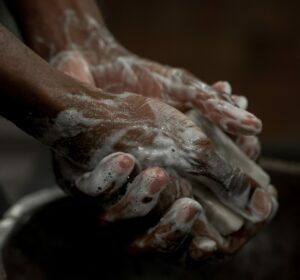 Following media reports of recent cluster outbreaks of typhoid fever and online conversations about gastro-related issues, the DSI-NRF Centre of Excellence in Food Security’s (CoE-FS) co-director Professor Lise Korsten has shared some guidelines for reducing risk of infection.
Following media reports of recent cluster outbreaks of typhoid fever and online conversations about gastro-related issues, the DSI-NRF Centre of Excellence in Food Security’s (CoE-FS) co-director Professor Lise Korsten has shared some guidelines for reducing risk of infection.
Enteric fever, in severe cases, is a potentially life-threatening infection. It includes typhoid fever, which is caused by the bacterium, Salmonella typhi. Enteric fever also includes paratyphoid fever, caused by the bacterium Salmonella Paratyphi A, B and C.
As noted by the National Institute for Communicable Diseases, South Africa is endemic (“the constant presence of a disease in a population within a geographic area”) for enteric fever caused by Salmonella Typhi. However, the prevalence of the disease is much lower than in other sub-Saharan African countries.
Key to prevention is hygiene, sanitation and clean, safe water, says Professor Korsten, who is based in the Department of Plant and Soil Sciences at the University of Pretoria. This is crucial to reducing risk, as the lack thereof is usually associated with enteric fever.
“If communities do not have access to potable water, boil the water you have and do not cross-contaminate food with dirty water.”
Further preventative measures include washing fresh produce with potable water, washing hands, sanitising, and ensuring that food preparation surfaces and bathrooms are kept clean.
“If communities do not have access to potable water, boil the water you have and do not cross-contaminate food with dirty water,” Korsten advises.
On the latter, food can be contaminated if polluted water is used or consumed, or if it’s used to wash cutlery and crockery.
Importantly, when preparing formula milk for babies, adhere to the steps indicated on the container and the information shared by clinics. Here, Korsten reminds those preparing the formula to wash their hands, boil, sanitise, and “keep your environment as clean as you can”.
COVID-19 lessons
“Perhaps now that we feel more relaxed with COVID-19 ‘not so prevalent’, we are neglecting basic, good handwashing practices and not using hand sanitisers or washing and disinfecting contact surfaces,” says Korsten.
“So, this shows the important lessons from COVID-19 that should become part of our lifestyle”.
Final advice from the CoE-FS co-director is to “keep it clean, keep your environment tidy, remove and dispose of waste effectively, and do not pollute our waterways — this is everybody’s business”.
Cover photo Ron Lach / Pexels.
Related articles and videos:
related Articles
CoE-FS wraps up a year of engagement at Science Forum South Africa
The DSI-NRF Centre of Excellence in Food Security (CoE-FS) finished off its year of conference engagement activities at Science Forum…
Away from the precipice; toward food security as a reality for all
Photo: Ashraf Hendricks/CoE-FS. “Food security at a tipping point; are we heading for ‘Zero Food’?”. That was the question that…
Microbes: Africa’s secret weapon
Photo PhotoMIX Company/Pexels. Africa is home to a rich tapestry of cultures, landscapes, and biodiversity, and at the heart of…



